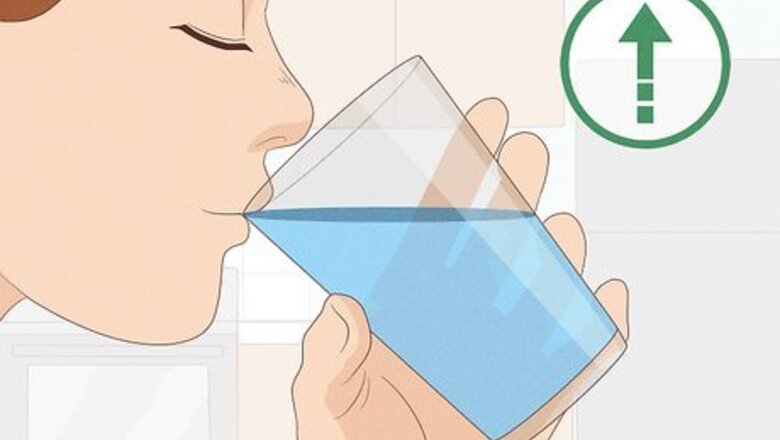
views
- Treat liver pain at home by drinking plenty of water, eating a balanced diet, and exercising.
- Cut out alcohol, sugar, fatty foods, herbal supplements, and diet pills. Ask your doctor before taking OTC pain medications to avoid long-term liver damage.
- If you have ongoing liver pain, visit your healthcare provider to get a diagnosis and treatment plan.
Drink plenty of water.
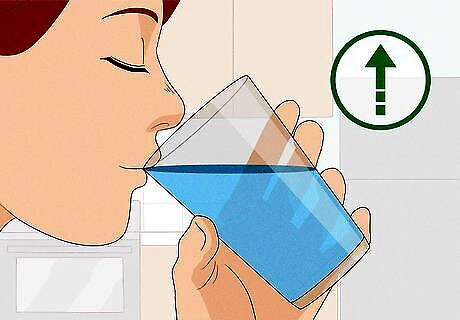
Water helps flush bad bacteria and replenishes your organs. Drink a few glasses of water until you feel fully hydrated and you’re no longer thirsty. This is especially helpful if your liver hurts as a result of alcohol consumption, since the water will rehydrate you and flush the alcohol you’re your system. Coconut water is a great alternative to water when it comes to liver health. You should drink 2–3 liters (0.53–0.79 US gal) of water every day to keep healthy. If you have liver pain and have not been drinking that much water, make it your goal.
Lie down to relieve pressure on your abdomen.
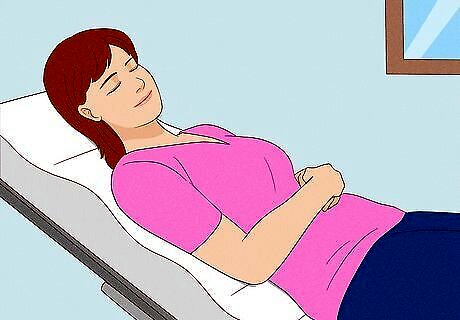
Take it easy and lie on your back to see if you feel better. If you’re feeling pain in your liver, you can often relieve some of it by positioning your body differently. Lie down or stretch your body out in a reclined position. If you’ve had any physical injury to your liver or you’ve got a GI virus, you should feel relief in no time. If you raise your legs when you lie down and you feel pain in your left shoulder, you don’t have liver pain—your spleen is rupturing. Get emergency medical help immediately. If you have any liver swelling, see your doctor. This is an early sign of liver cancer.
Consume coffee or tea for chronic pain.
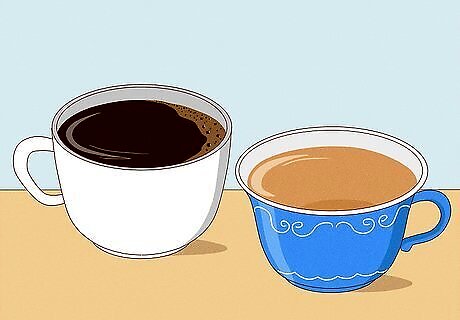
A daily cup of coffee or tea is excellent for daily liver pain. If you don’t have coffee or tea in the morning and you have a condition that cause chronic liver pain, now is the time to start. Coffee and tea lower the liver enzymes that cause inflammation, so a daily cup of caffeinated (non-sugary) beverages like coffee and tea will reduce pain throughout the day. Don’t add sugar to your coffee or tea, since sugar is uniquely bad for your liver. Honey in your tea is excellent, though!
Stay away from fatty, fried foods and sugar.
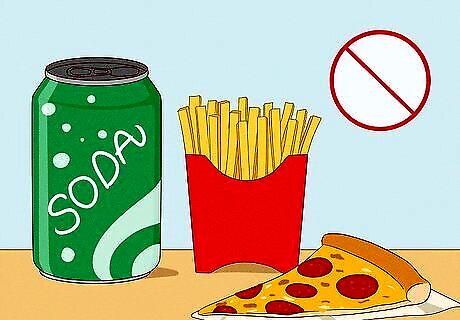
Make it easy on your body by eating a fresh, healthy diet. Fatty, greasy, or fried foods can increase liver pain because they force the liver to work harder than it should. One of the liver's functions is to process fat, so stick to a light, healthy diet to give your liver time to recover and heal. Foods that are uniquely good for your liver include: chicken, fish, olives, olive oil, nuts, berries, and leafy vegetables. Unproductive foods for your liver include: Anything deep fried, pizza, fast food, sugar, and high-fructose corn syrup. Your body processes sugar the same way as alcohol, so avoid candy, sweets, and soda. Don’t overdo it on the protein. Excessive consumption of protein can contribute to fatty liver disease.
Do not take OTC pain medication.
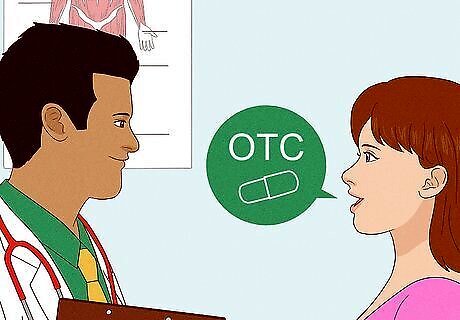
Consult a doctor before you take any OTC medications. Your liver is responsible for breaking down medications and sending the chemicals where they need to go. But if you have undiagnosed liver pain, your liver may not be working correctly. Talk to your doctor before you consume any medications for you pain. You may still be able to take something, but it’s best to check first. Taking too much acetaminophen or ibuprofen is specifically problematic. These medications are very difficult for your liver to break down.
Avoid consuming herbal remedies.
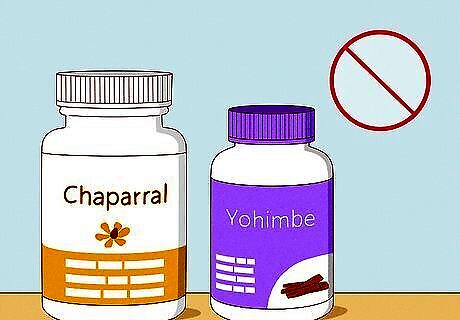
Your liver may not be able to break down natural products correctly. Many of the “liver health” supplements out there contain herbs or ingredients that are toxic to your liver if your liver isn’t functioning correctly. It’s reasonable to want a natural solution for your liver pain, but herbal supplements aren’t regulated the same way medication is and your body may not be able to process them. Natural ingredients that are known to be toxic for the liver (even when it’s healthy) include: chaparral, comfrey tea, kava, skullcap, and yohimbe. Diet pills and muscle builders are also dangerous for the liver.
Exercise and maintain a healthy weight.
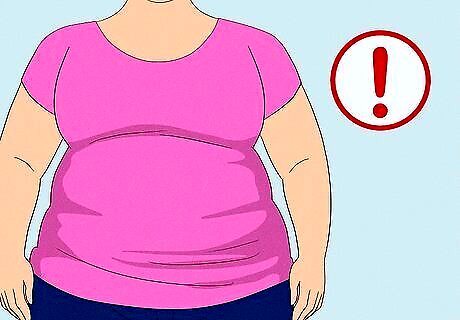
Obesity and high blood pressure are major risk factors for liver pain. All of the conditions that cause liver pain are prevented or treated by maintaining a healthy weight and exercising to maintain a healthy blood pressure. Talk to your doctor to find a healthy and safe way to start working out and losing weight without further putting your liver at risk. If you already have liver pain, don’t start working out 150 minutes a week and pumping iron without talking to a doctor first.
Stop drinking alcohol.
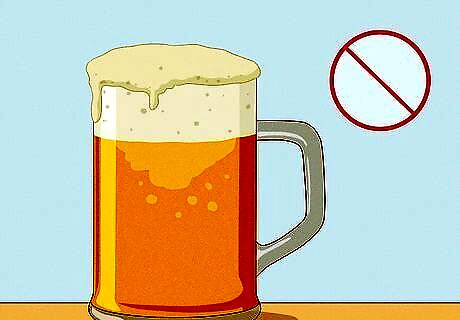
Alcohol consumption will contribute directly to your liver pain. If your liver is painful due to drinking too much alcohol, stop drinking to eliminate the pain. This will allow your liver to recover from being overworked and to regain normal function. You are at risk of getting alcoholic liver disease if you consume more than 15 drinks a week. There are some liver problems that are caused by alcohol that can be reversed by simply stopping drinking. For instance, fatty liver and inflammation can be cleared up within 6 weeks of not drinking alcohol. If you have alcoholic liver disease, hepatitis C, hepatitis B, non-alcoholic fatty liver disease, or any condition that can cause cirrhosis, you should not drink any alcohol.
See your doctor if the pain persists.
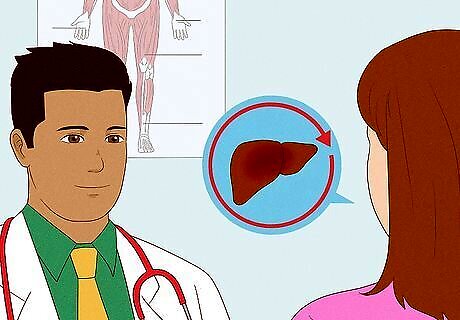
Liver pain should go away, so see your doctor if it sticks around. Even if you only have mild liver pain, you should consult a doctor about it if it is ongoing. Your doctor will discuss your symptoms with you and will do a physical exam. The physical exam will typically include testing your basic vital signs and feeling the liver for inflammation. Get immediate emergency medical care if the pain is severe and combined with nausea, dizziness, hallucinations, or if the pain is so severe that you can’t sit still. Liver pain is actually fairly rare if you don’t have a disease causing it. Your doctor may come up with an alternative theory based on your symptoms. Liver pain can be a symptom of hepatitis A, non-alcoholic fatty liver disease, gallbladder disease, cirrhosis, Reye syndrome, hemochromatosis, and liver cancer.
Develop a treatment plan with your doctor.
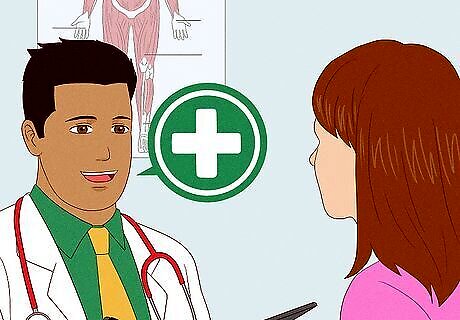
Treating whatever is causing the liver pain will alleviate your issue. See your doctor to get a diagnosis. Exams may include a combination of liver function tests and imaging of your organ. Once you know what’s causing the liver pain, you and your doctor can collaborate to identify the right path forward. Your doctor may be able to prescribe you a pain reliever in the mean time. It is likely that you will need both medication and lifestyle changes, such as weight loss or a special diet, to treat your liver pain. Your doctor may tell you to take over-the-counter pain relievers. Be sure to follow their recommendations for dosage, as exceeding recommended doses could tax your liver. Your medical treatment will vary depending on what is causing your pain. If you have a less serious illness, such as non-alcoholic fatty liver disease, it may be managed exclusively by making your diet healthier and reducing your cholesterol.


















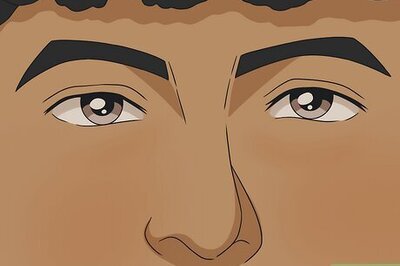

Comments
0 comment